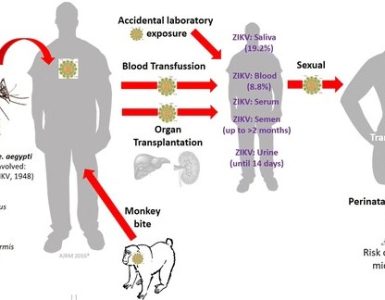 Despite the continuing technological and scientific advances in medicine, old disease threats are starting to resurface as public health problems.
Despite the continuing technological and scientific advances in medicine, old disease threats are starting to resurface as public health problems.
Some argue that we are rapidly approaching a “post-antibiotic” era due to the increasingly bleak problem of multi-drug resistant bacteria. Antibiotics do not do squat for viral infections, but antiviral drug resistance is also a serious issue. The search for new drugs to treat infections is ongoing, but the reality of the situation is that this is always going to be an arms race.
Preventing infections from spreading is a more sustainable approach. Behavioral measures can help, especially with infections spread through close contact, and sanitation is effective for control of a lot of food-borne and water-borne illnesses, but the most effective protection against extremely contagious illnesses is often vaccines.
With vaccines, we have eradicated smallpox, nearly eliminated poliovirus and made potentially serious illnesses that used to be incredibly common in childhood, such as measles and mumps, far less common than they used to be. In 2000, for instance, the World Health Organization declared measles eliminated from the U.S.
In spite of the evidence for the efficacy of vaccines, there has been significant public opposition to vaccination, largely due to the myth that there is a link between autism and the measles, mumps and rubella vaccine.
This link has been thoroughly and repeatedly discredited. The researcher who was essentially responsible for sparking this controversy, Andrew Wakefield, had his paper and medical license revoked when he was found unambiguously guilty of misconduct and dishonesty.
The myth lives on. So does measles.
There have been outbreaks of the virus among pockets of unvaccinated individuals in the U.S. when people have brought it over from another country. Outbreaks like this are more likely to occur if you have many unvaccinated individuals in one community.
On the surface, it may seem like vaccination is merely a personal choice about your health. But if enough people in a population go unvaccinated against a disease, the disease can spread much more easily through the population. “Herd immunity” is lost. This means that people who can’t get vaccinated, like babies and people with compromised immune systems, are also no longer protected.
To see this, you just have to look at pertussis, or whooping cough, a disease that is also seeing a resurgence. Infants are most vulnerable to serious disease from pertussis infection. Unvaccinated children and adults can spread pertussis to babies that are too young to have been vaccinated, sometimes leading to pneumonia and death.
More relevant to most college students is the seasonal flu. Influenza is a particularly annoying virus because of its potential for drastic recombination, so the prevalent strains change from season to season and you have to get a flu shot every year to stay protected. It’s not required, so many people don’t get vaccinated.
People tend to think of the flu as a minor illness, but a lot of this is due to misconceptions about what the flu actually is. It’s not a stomach bug or a cold. If you don’t know why people were freaking out about the swine flu a few years ago, look up the 1918 flu pandemic.
Most deaths due to the flu are typically seen in populations that are more vulnerable to all sorts of things: the old, the very young and the immunocompromised. Some strains, such as this season’s H1N1 and the H1N1 responsible for the 1918 pandemic, cause higher death rates in healthy adults.
Getting vaccinated protects you, and it also protects other people in your community.
Source: The Eastern Echo

















